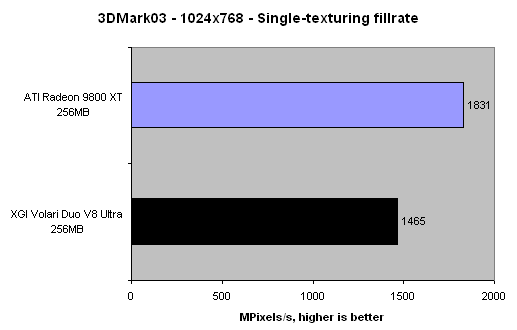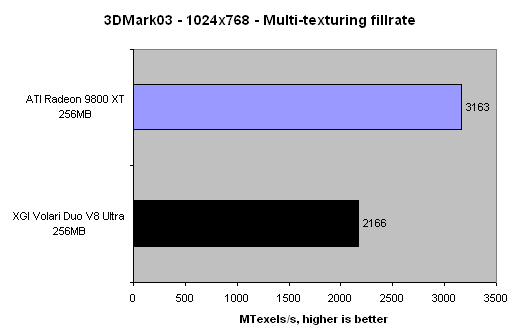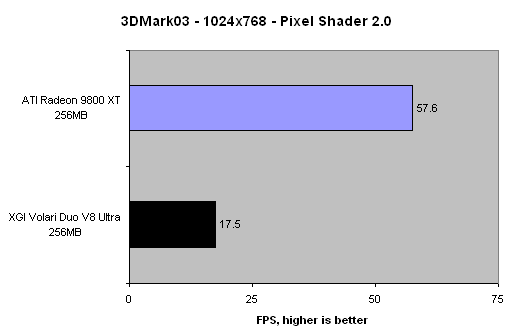Theoretical tests
| Card | XGI Volari Duo V8 Ultra | ATI Radeon 9800 XT |
| Manufacturing process | 0.15-micron | 0.15-micron |
| Memory bus width | 2 x 128-bit | 256-bit |
| Transistor count | 80m each? | 107m |
| Core speed | 350MHz | 412MHz |
| Rendering pipelines | 2 x 8 | 8 |
| Theoretical pixel fillrate | 5.6 GPixel/s | 3.296 GPixels/s |
| Texture units per pipe | 1 | 1 |
| Theoretical texel fillrate | 5.6 GTexels/s | 3.296 GTexels/s |
| Memory type | DDR-II | DDR |
| Memory Speed | 900MHz | 730MHz |
| Memory bandwidth | 28.8GB/s | 23.4GB/s |
| Memory size as standard | 256MB | 256MB |
| Pixel shader version | 2.0 | 2.0 |
| Pixel shaders in total | 8 | 8 |
| Vertex shader version | 2.0 | 2.0 |
| Vertex shaders in total | 4 | 4 |
| Antialiasing samples | 2, 4x | 2,4,6x |
| Type | Supersampling | RGMS (2X, 4X), Sparse Grid Multisampling (6X) |
| Anisotropic filtering samples | 2, 4 | 2,4,8,16 |
| Type | Non-adaptive? | Adaptive |
Looks impressive enough here. What we can't explicitly tell is if XGI have built in the usual bandwidth-saving functions such as z and colour compression. The absence of these features in the product literature suggests that the card does not. If not, it's a major, major ommision from an otherwise potent design. We're also left to rue a maximum anisotropic filtering limit of 4X. XGI further hampers potential performance by choosing the supersampling method for getting rid of jaggies.
3DMark03's fillrate and shading tests were run at 1024x768. We want to see how close to the impressive theoretical maximum XGI's dual-chip card can get.

A 16-pipe design can theoretically put out 5.6GPixels/s. 3DMark03's analysis asserts that barely 25% of that figure is being realised. The perils of a dual-chip design surface.

Multi-texturing fillrate is far lower than the 9800 XT's. We've not touched on the apparent lack of z and colour compression, either.

Pixel Shader 2.0 is present but performance is, well, dismal. We've see higher figures from a Radeon 9600 XT. Specifications can be misleading.

Vertex shader performance, whilst looking better in comparison to the 9800 XT's, is nothing extraordinary. Synthetic testing has been a letdown, really.









